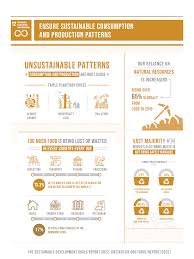“`html
The Importance of Sustainable Consumption and Production (Goal 12)
Goal 12 of the United Nations Sustainable Development Goals focuses on ensuring sustainable consumption and production patterns. This goal emphasizes the need to decouple economic growth from environmental degradation, promote resource efficiency, and encourage sustainable lifestyles.
Sustainable consumption and production are crucial for addressing global challenges such as climate change, biodiversity loss, and pollution. By adopting sustainable practices, we can reduce our ecological footprint and preserve natural resources for future generations.
One key aspect of Goal 12 is promoting the use of cleaner technologies and industrial processes that minimize waste generation. This can lead to increased efficiency in resource utilization and reduced emissions of harmful pollutants.
Individuals also play a vital role in achieving Goal 12 by making conscious choices about what they consume and how they dispose of waste. By opting for products with minimal environmental impact and recycling or reusing materials whenever possible, we can contribute to a more sustainable world.
Businesses are encouraged to integrate sustainability into their operations by implementing eco-friendly practices, such as reducing packaging waste, optimizing energy usage, and supporting fair labor practices throughout their supply chains.
Overall, Goal 12 serves as a call to action for governments, businesses, and individuals to work together towards a more sustainable future. By embracing sustainable consumption and production principles, we can create a world where prosperity is balanced with environmental stewardship.
“`
Understanding Goal 12: Sustainable Consumption and Production – Key Questions and Insights
- What is Goal 12 of the United Nations Sustainable Development Goals?
- Why is sustainable consumption and production important?
- How can individuals contribute to achieving Goal 12?
- What are some examples of sustainable practices in consumption and production?
- How do businesses play a role in promoting sustainable consumption and production?
- What are the benefits of decoupling economic growth from environmental degradation?
What is Goal 12 of the United Nations Sustainable Development Goals?
“`html
Goal 12 of the United Nations Sustainable Development Goals focuses on ensuring sustainable consumption and production patterns. It aims to promote responsible and efficient use of resources, reduce waste generation, and minimize the environmental impact of economic activities. By encouraging sustainable practices at all levels – from individuals to industries – Goal 12 seeks to create a more sustainable and resilient world for present and future generations.
“`
Why is sustainable consumption and production important?
“`html
Sustainable consumption and production are important because they are essential for ensuring the long-term well-being of our planet and its inhabitants. By adopting sustainable practices, we can minimize the depletion of natural resources, reduce pollution levels, and mitigate the impacts of climate change. Sustainable consumption encourages us to make informed choices about what we consume and how we use resources, leading to a more efficient and responsible use of materials. On the other hand, sustainable production promotes eco-friendly processes that prioritize resource efficiency and minimize waste generation. Together, sustainable consumption and production help us build a more resilient and environmentally conscious society for current and future generations.
“`
How can individuals contribute to achieving Goal 12?
“`html
Individuals play a crucial role in contributing to the achievement of Goal 12, which focuses on sustainable consumption and production. One way individuals can contribute is by making conscious choices in their daily lives, such as reducing waste by recycling and reusing materials, opting for products with minimal environmental impact, and conserving energy at home. By adopting sustainable practices and advocating for eco-friendly solutions in their communities, individuals can help drive positive change towards a more sustainable future. Additionally, supporting businesses that prioritize sustainability and holding policymakers accountable for implementing environmentally friendly policies are effective ways for individuals to make a meaningful impact on Goal 12.
“`
What are some examples of sustainable practices in consumption and production?
“`html
There are several examples of sustainable practices in consumption and production that can help achieve Goal 12 of the United Nations Sustainable Development Goals. One common practice is the adoption of circular economy principles, where resources are reused, recycled, or repurposed to minimize waste and reduce environmental impact. Another example is the promotion of energy-efficient technologies and renewable energy sources to lower carbon emissions and enhance resource efficiency. Additionally, implementing sustainable supply chain management strategies, such as sourcing from ethical suppliers and reducing transportation-related emissions, can contribute to more sustainable consumption and production patterns. By embracing these practices and incorporating them into daily operations, businesses and individuals can play a significant role in advancing Goal 12’s objectives for a more sustainable future.
“`
How do businesses play a role in promoting sustainable consumption and production?
“`html
Businesses play a crucial role in promoting sustainable consumption and production by integrating eco-friendly practices into their operations. By adopting sustainable strategies such as reducing waste, optimizing resource use, and implementing green technologies, businesses can minimize their environmental impact and contribute to a more sustainable future. Additionally, businesses can influence consumer behavior by offering environmentally friendly products, educating customers about sustainability issues, and promoting responsible consumption practices. Through these efforts, businesses not only fulfill their corporate social responsibility but also drive positive change towards achieving Goal 12 of the United Nations Sustainable Development Goals.
“`
What are the benefits of decoupling economic growth from environmental degradation?
“`html
Decoupling economic growth from environmental degradation offers a range of benefits that are essential for sustainable development. By adopting this approach, societies can achieve prosperity without compromising the health of the planet. One significant advantage is the preservation of natural resources for future generations, ensuring that ecosystems remain intact and biodiversity thrives. Decoupling also leads to reduced pollution levels, cleaner air and water, and improved public health outcomes. Furthermore, it promotes innovation in green technologies and practices, creating new opportunities for economic growth while mitigating climate change impacts. Overall, decoupling economic growth from environmental degradation paves the way for a more resilient and equitable society that prioritizes both human well-being and environmental protection.
“`

